Rachel Reeves is splashing the cash today as fears mount that Brits will need to pick up the bill later.
Unveiling the Spending Review in the Commons, the Chancellor claimed she is ‘renewing Britain’.
She is allocating huge sums to departments for the coming years, after loosening the government’s borrowing rules at the last Budget.
But despite Ms Reeves boasting that her new approach means Labour can spend a staggering £300billion more over the next five years than the Tories planned, critics have warned she does not know where the money is coming from.
The generous fiscal envelope set last Autumn has been put under massive pressure by the economy slowing down and Donald Trump‘s trade war.
There are demands to pump far more cash into defence, while Ms Reeves has already made an humiliating U-turn on winter fuel allowance cuts and is facing a Labour revolts on other benefits curbs.
That has led analysts and political rivals to argue that more tax increases are ‘inevitable’ – although the funding gap will not crystalise until the next fiscal package.
Ms Reeves fuelled the speculation by telling MPs that there would be no change to her fiscal rules – and day-to-day spending must be covered by ‘tax receipts’.
At PMQs before the Chancellor took to her feet, Keir Starmer dodged ruling out more tax rises – even though the Budget last year imposed the biggest increase for a single fiscal event in record.
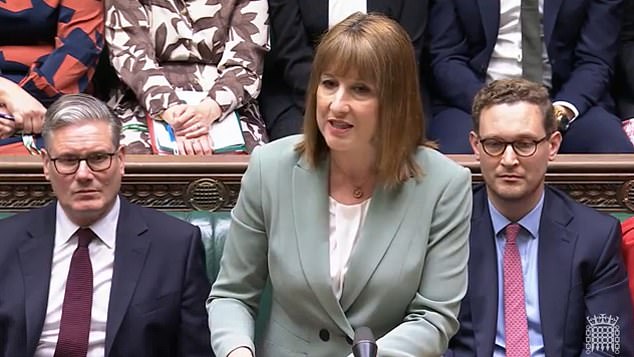
Unveiling the Spending Review in the Commons, the Chancellor claimed she is ‘renewing Britain’

At PMQs before Ms Reeves took to her feet, Keir Starmer dodged ruling out more tax rises – even though the Budget last year imposed the biggest increase for a single fiscal event in record
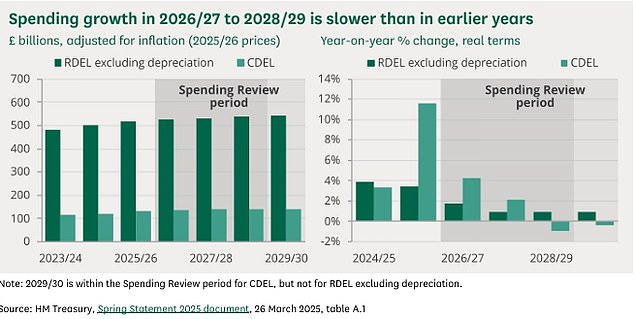
The Chancellor is allocating huge sums to departments for the coming years, after loosening the government’s borrowing rules at the last Budget
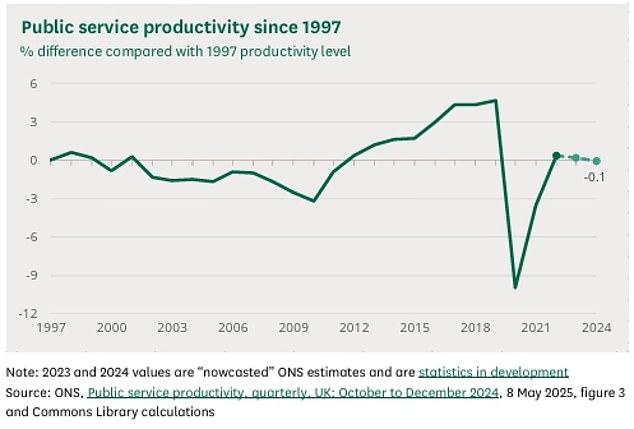
Public sector productivity has been making almost no progress despite investment
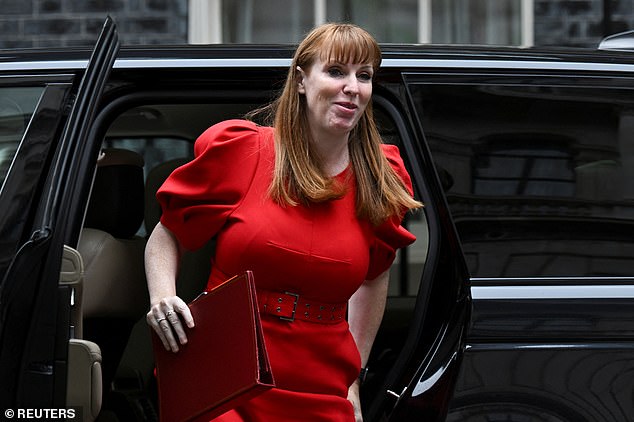
Deputy PM Angela Rayner has secured a major spending commitment for affordable housing
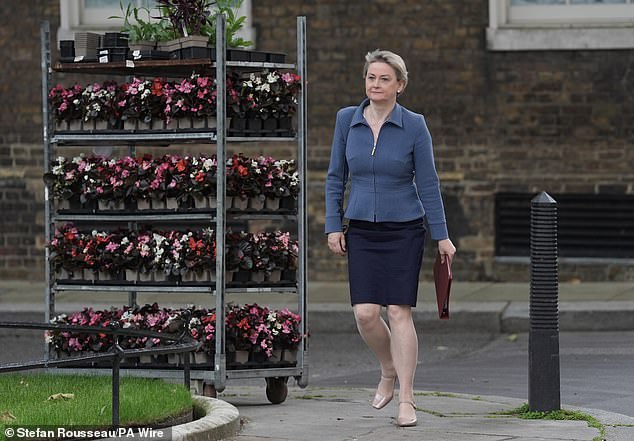
Home Secretary Yvette Cooper is thought to be one of the losers from the spending review
The backdrop to the decisions has been looking increasingly grim, with Labour trailing Reform in the polls. Figures yesterday showed unemployment rising, and a survey found just 12 per cent of Brits believe Ms Reeves is doing a good job.
Ministers have described the spending plans – equal to an extra £8,100 for every taxpayer in Britain – as ‘the end of austerity’.
Sir Keir told Cabinet that the review ‘marks the end of the first phase of this Government, as we move to a new phase that delivers on the promise of change for working people all around the country and invests in Britain’s renewal’.
Ms Reeves said the spending review ‘would invest in economic growth, creating jobs and backing British industry in all parts of the country’.
She promised ‘investments in defence, protection of our borders, and energy security; and public services including health and education’.
In her speech, Ms Reeves admitted voters do not feel like they have more money in their pockets as Labour prepares to mark one year in office.
But she insisted she is ‘renewing Britain’.
‘This Government’s task – my task – and the purpose of this spending review is to change that, to ensure that renewal is felt in people’s everyday lives, their jobs, their communities,’ she said.
Last week, Ms Reeves refused to rule out any further tax increases.
Spending will be skewed heavily towards the NHS in an attempt to cut waiting lists further.
Defence is set to be another big winner after Keir Starmer committed to spending 2.5 per cent of GDP by 2027.
However, there is still no specific timetable for the ‘ambition’ to hit 3 per cent. And that is below the 3.5 per cent target Nato is expected to agree at a summit later this month.
Allies of Angela Rayner have been claiming victory in her bid to secure more cash towards meeting Labour’s target of building 1.5million new homes by the next election.
The Deputy PM, who is responsible for housing policy, had a series of bust-ups with Treasury ministers and No 10 over the issue.
The Treasury had proposed a modest increase in the social housing budget from £2.3billion a year to £2.5billion. But government sources last night said Ms Rayner had secured a £39billion settlement over ten years.
The Treasury said it was the biggest boost to social housing in a generation.
But the growing cost of servicing the UK’s debt mountain means other areas of spending, including the police, face a budget squeeze in future years.
The Tories branded Ms Reeves the ‘Spend Today, Tax Tomorrow Chancellor’.
Shadow chancellor Mel Stride said: ‘Labour is spending money it doesn’t have, with no credible plan to pay for it.
‘That means more borrowing, more debt, and, inevitably, more tax rises in the Autumn Budget. Don’t be fooled. We can’t afford Labour.’
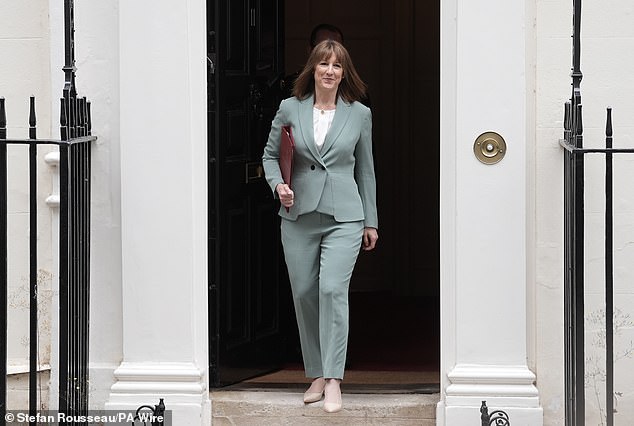
Rachel Reeves is splashing the cash today as fears mount that Brits will need to pick up the bill later
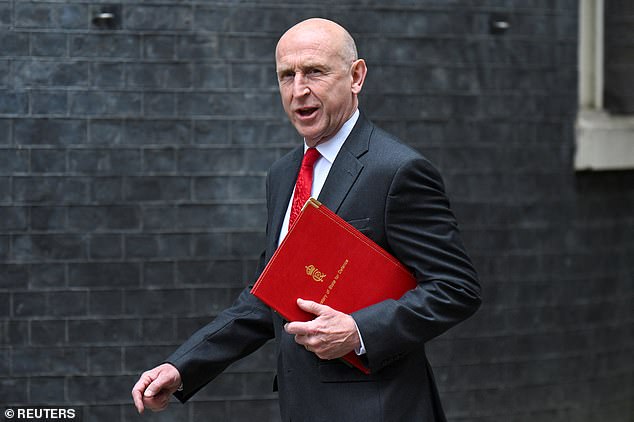
Defence Secretary John Healey has been pushing the Treasury for more funding
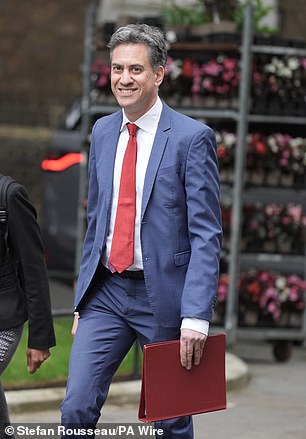
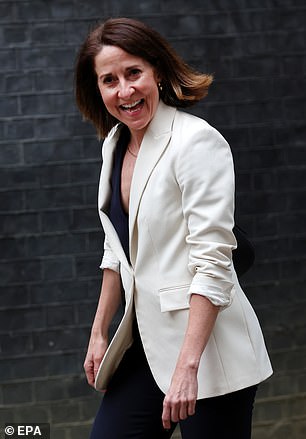
Ed Miliband and Liz Kendall were at the Cabinet meeting this morning
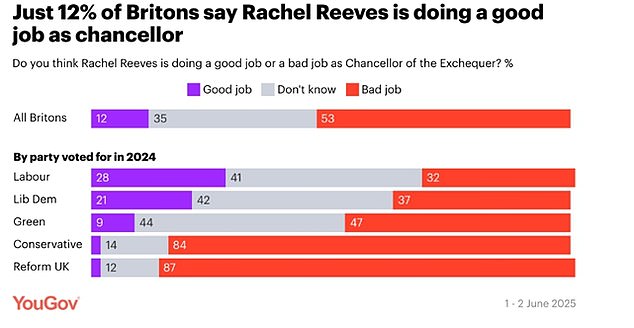
A survey has found just 12 per cent of Brits believe Ms Reeves is doing a good job
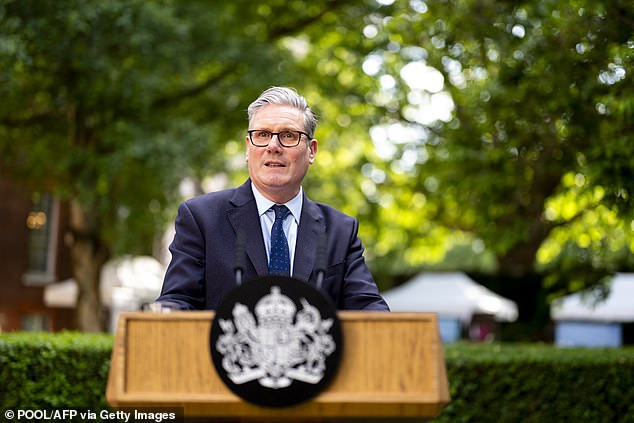
The Chancellor and Prime Minister (pictured) have repeatedly claimed that Labour has ‘fixed the foundations’ of the economy, despite rising inflation and cuts to official growth forecasts
Sir Mel added: ‘This spending review won’t be a plan for the future – it will be a dangerous gamble with Britain’s economic stability.
‘Labour is spending money it doesn’t have, with no credible plan to pay for it. That means more borrowing, more debt, and, inevitably, more tax rises in the autumn Budget.’
In recent days, the Chancellor and Prime Minister have repeatedly claimed that Labour has ‘fixed the foundations’ of the economy, despite rising inflation and cuts to official growth forecasts.
Yesterday’s stark employment figures underline the real-world impact of Labour’s tax and spend approach. They revealed UK payroll numbers have shrunk by 276,000 over the past seven months. In May alone, payrolls fell by 109,000 – the worst month since the pandemic.
Meanwhile the unemployment rate has climbed to 4.6 per cent, the highest in nearly four years.
Experts pinned the blame on Ms Reeves’s £25 billion raid on employer National Insurance, which was announced in the October Budget and took effect in April. Payroll numbers fell every month since the Budget.
WINNERS
The NHS
Among the main announcements is expected to be a £30 billion increase in NHS funding, a rise of around 2.8 per cent in real terms.
The Institute for Fiscal Studies has already warned that any increase in NHS funding above 2.5 per cent is likely to mean real-terms cuts for other departments, or further tax rises to come in the budget this autumn.
The cash injection, which amounts to £17 billion in real terms, comes after Sir Keir Starmer pledged to ensure that by the next election 92 per cent of patients in England waiting for planned treatment are seen within 18 weeks of being referred.
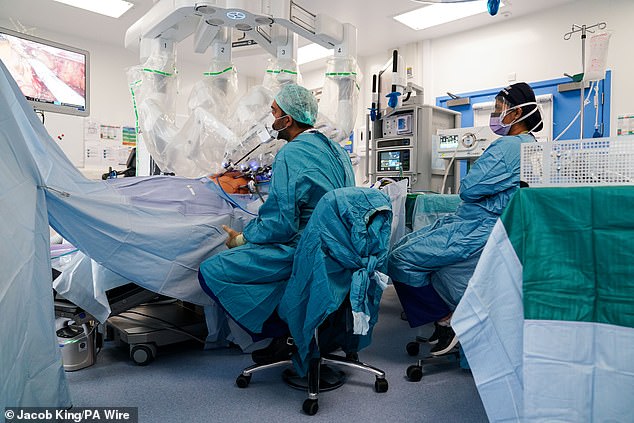
The Institute for Fiscal Studies has already warned that any increase in NHS funding above 2.5 per cent is likely to mean real-terms cuts for other departments, or further tax rises to come in the budget this autumn.
Latest NHS data suggests around 60 per cent of people are currently seen in this time and figures released last month showed the overall number of patients on waiting lists had risen slightly from 6.24 million to 6.25 million.
But it comes just nine months after The NHS was a major winner from Ms Reeves’s first Budget last October, when the Chancellor as she poured £22.6billion more into the flatlining health service.
At the time Health Secretary Wes Streeting was brutally clear that this may not be enough, because the NHS is ‘not just on its knees, it’s on its face’.
Schools
A senior minister revealed at the weekend that schools are set to receive a funding boost in the spending review.
Technology Secretary Peter Kyle said the Government will commit to investing ‘the most we’ve ever spent per pupil’.
Facing questions from broadcasters on Sunday about which public services will be prioritised, Mr Kyle said ‘every part of our society is struggling’ and numerous sectors had asked Chancellor Rachel Reeves for more money.
A report earlier this year warned schools and universities are facing squeezed budgets next year as rising costs are likely to outstrip funding growth, a new report has warned.
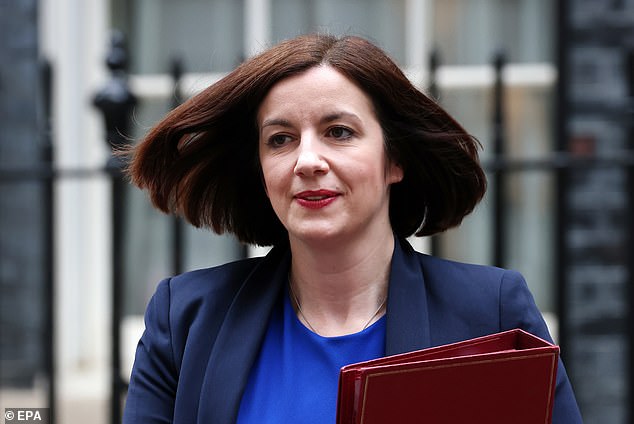
Education is set to be one of the big winners today. Pictured is Education Secretary Bridget Phillipson
The Institute for Fiscal Studies (IFS) said state school budgets will remain ‘very tight’ and universities will not reach a ‘secure financial footing’ in 2025/26.
This is despite Labour’s new VAT on private school fees, which will pay for 6,500 new teachers, and a university tuition fee rise of £285 to £9,535.
Earlier this week the National Education Union called for a 2 per cent wealth tax to be used to pour more money into education.
General secretary Daniel Kebede said: ‘Our schools are at breaking point, with cuts leading to fewer resources, larger class sizes, and the erosion of subjects that are crucial to a well-rounded education. The Government must stop short-changing education.
‘Now is the time for a wealth tax, and closing unfair loopholes to ensure the very richest pay their fair share. Instead of picking the pockets of our pupils, it’s time to tax profits and prioritise our children and our communities over corporate greed.’
Defence
Defence spending is expected to be increased as the government reacts to the growing military threat from Vladimir Putin’s Russia.
It comes days after the NATO secretary general warned that Britain’s only alternative to investing more in the military would be to start learning Russia.
Former Dutch PM Mark Rutte issued the chilling message while in London for talks with Sir Keir ahead of a NATO summit later this month.
NATO allies are expected to be asked at the gathering to agree a commitment on allocating 3.5 per cent of GDP to core defence spending by the 2030s.
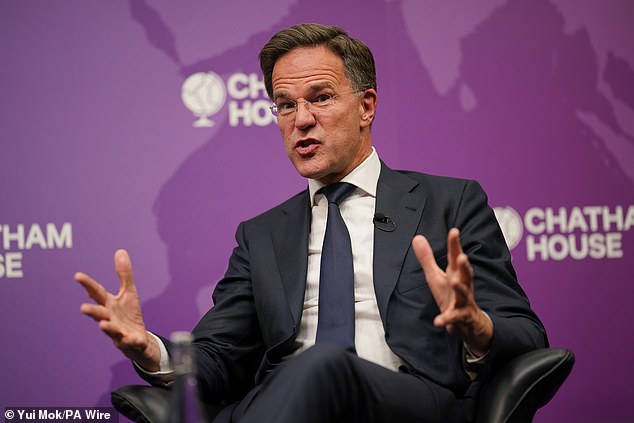
It comes days after NATO secretary general Mark Rutte warned that Britain’s only alternative to investing more in the military would be to start learning Russia.
A further 1.5 per cent of GDP would be required for ‘defence-related expenditure’ under Mr Rutte’s plan to strengthen the alliance.
It follows pressure from US President Donald Trump on European members of NATO to hike their military budgets.
There are questions about how the UK would fund such an huge increase – roughly equivalent to an extra £30billion annually.
Britain allocated 2.33 per cent of GDP to defence last year, and Sir Keir has only committed to reaching 2.5 per cent by April 2027.
The Labour Government has an ‘ambition’ of increasing that to 3 per cent in the next parliament – likely to run to 2034.
Social housing
Other announcements expected on Wednesday include £39 billion for social and affordable housing over the next decade as the Government aims to meet its target of building 1.5 million new homes by the next election.
The Treasury said this would see annual investment in affordable housing rise to £4 billion by 2029/30, almost double the average of £2.3 billion between 2021 and 2026.
The additional spending has been welcomed by homelessness charities, with Crisis calling it ‘a determined political signal that housing really matters’ and Shelter describing the move as ‘a watershed moment in tackling the housing emergency’.
Flagship planning reforms which are ‘critical’ to the homes pledge cleared the Commons last night.
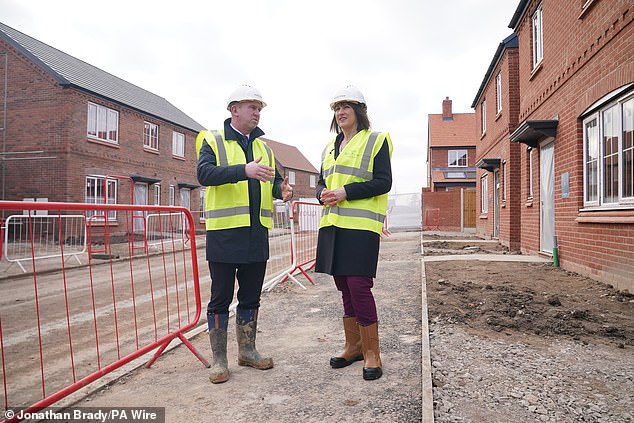
The Treasury said this would see annual investment in affordable housing rise to £4 billion by 2029/30, almost double the average of £2.3 billion between 2021 and 2026.
MPs voted by 306 to 174, majority 132, to approve the Planning and Infrastructure Bill at third reading on Tuesday evening.
Housing minister Matthew Pennycook said the Bill, which aims to improve certainty and decision-making in the planning system, will help to tackle the UK’s housing crisis.
But Tory shadow housing secretary Kevin Hollinrake described the draft legislation as ‘dangerous’ and warned it could lead to ‘rows of uninspiring concrete boxes’.
In addition, the 200-year-old law criminalising rough sleepers is to be scrapped in what homeless charities have hailed a ‘landmark moment’.
The Vagrancy Act, introduced in 1824 for punishment of ‘idle and disorderly persons, and rogues and vagabonds, in England’, is to be repealed by spring next year, the Government has confirmed.
LOSERS
The police
Home Secretary Yvette Cooper was the last minister to reach a deal with the Treasury, amid a major row over how much money she would get for policing.
Reports suggest she will get an above-inflation boost for forces at the expense of other parts of her department, but questions remain over whether it is enough.
On Monday, West Midlands Police and Crime Commissioner (PCC) Simon Foster called for the reinstatement of 700 officers the force has seen cut since 2010, while Hertfordshire’s PCC Jonathan Ash-Edwards warned the force is facing a growing burden.
Their comments followed warnings by the president of the Police Superintendents’ Association Nick Smart, and Tiff Lynch, acting national chairman for the Police Federation of England and Wales.

Home Secretary Yvette Cooper was the last minister to reach a deal with the Treasury, amid a major row over how much money she would get for policing.
In December, the National Police Chiefs Council (NPCC) warned that forces in England and Wales were facing a £1.3 billion shortfall over the next two years.
And last month, head of the Metropolitan Police Sir Mark Rowley joined with head of the NPCC Gavin Stephens and four other chief constables to call for more investment.
But the Home Office will also receive a £680 million cash boost for border security, according to the Sun newspaper.
The paper reported Ms Cooper has gained £100 million to spend on tackling illegal migration this year and a further £580 million over the next three years for border police and surveillance, including more drones.
The Government has vowed to crack down on people-smuggling and Channel crossings since coming to power in July last year.
This includes by funding elite officers to increase patrols along the northern French coastline and launching a specialist intelligence unit in Dunkirk to track down people smugglers.
It has also established a Border Security Command to lead strategy and its Border Security, Asylum and Immigration Bill, currently going through Parliament, seeks to introduce new criminal offences and hand counter terror-style powers to law enforcement agencies to target smuggling gangs.











